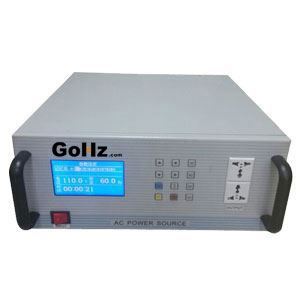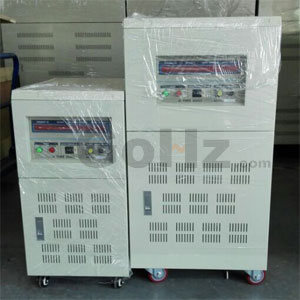Home » AC Power Source » 50Hz machine running on 60Hz power supply
50Hz machine running on 60Hz power supply
The biggest issue is LOAD. This is described as a pump machine, I assume a centrifugal. Per the affinity laws, increasing the speed (from 50Hz to 60Hz) produces the following results: Flow increases in direct proportion to speed. Required shaft torque (and resulting line pressure) increases with the square of the speed. Required power increases with the CUBE of the speed. A 20% increase in speed (all other factors being equal) results in a 20% increase in flow, a 44% increase in required torque, and a 73% increase in required power.

Chances are good that the motor will NOT be able to drive the pump unless the flow is throttled way back. Even then, the head pressure increase may cause excessive load on the motor. Putting an inlet restriction to reduce flow may (MAY) result in pump cavitation. If this is a conveyor application, probably not an issue. If this is a belt-driven pump, change the pulleys and slow the pump down. But if it's a direct-drive pump, it probably isn't going to run very long before tripping out on overload.
To put it simply, look at the name plate data and see if the machine is rated for 50 Hz / 60 Hz combination. If it is you can do that. If it is not, then you need to buy a 50/60 Hz motor for the operation. In the future when you buy a motor, make sure they are rated for both 50Hz & 60Hz frequencies. Then you won't have that problem.
We don't know the machine or supply voltage so all we are able to say for sure is, maybe. As you said, the 50Hz vs 60Hz are not a problem as long as the voltages maintain the proper V/Hz. The load is the final factor and since we don't know how much headroom he had in the original arrangement, all he can do is try it. It will either work or it won't but I'd try it before discarding the machine. Just trying it won't do any damage.
Why is it so hard to ask a complete question? What type of pump, what size motor, what voltage at 50 Hz, what voltage at 60 Hz, why the change from 50 to 60 Hz? Why don't you know a motor or pump distributor/representative who can answer your questions?
In general for this type of question:

Chances are good that the motor will NOT be able to drive the pump unless the flow is throttled way back. Even then, the head pressure increase may cause excessive load on the motor. Putting an inlet restriction to reduce flow may (MAY) result in pump cavitation. If this is a conveyor application, probably not an issue. If this is a belt-driven pump, change the pulleys and slow the pump down. But if it's a direct-drive pump, it probably isn't going to run very long before tripping out on overload.
To put it simply, look at the name plate data and see if the machine is rated for 50 Hz / 60 Hz combination. If it is you can do that. If it is not, then you need to buy a 50/60 Hz motor for the operation. In the future when you buy a motor, make sure they are rated for both 50Hz & 60Hz frequencies. Then you won't have that problem.
We don't know the machine or supply voltage so all we are able to say for sure is, maybe. As you said, the 50Hz vs 60Hz are not a problem as long as the voltages maintain the proper V/Hz. The load is the final factor and since we don't know how much headroom he had in the original arrangement, all he can do is try it. It will either work or it won't but I'd try it before discarding the machine. Just trying it won't do any damage.
Why is it so hard to ask a complete question? What type of pump, what size motor, what voltage at 50 Hz, what voltage at 60 Hz, why the change from 50 to 60 Hz? Why don't you know a motor or pump distributor/representative who can answer your questions?
In general for this type of question:
- Get the specs for your machine and see if it is designed to operate at the new condition you want to use.
- Next get the specs on your load, and find out where on the starting and operating curves you have been.
- Last, see how the changes in the machine performance will change the load performance. Is the machine still operating within specs?
Post a Comment:
You may also like:
50Hz 60Hz Frequency Converter Setting
Using GoHz frequency converter to
Or customize your own converters.
- Convert 220v 50Hz to 110v 60Hz,
- Convert 120v 60Hz to 230v 50Hz,
- Convert 110v 60Hz to 240v 50Hz,
- Convert 480v 60Hz to 380v 50Hz,
- Convert 400v 50Hz to 460v 60Hz,
- Convert 240v 60Hz to 380v 50Hz,
Or customize your own converters.
Featured Articles
460v 60Hz motor on 400v 50Hz power ...
 Often the European motors at 1hp size are universal for 50Hz or 60Hz power supply, as long as you have 400V x 50Hz and 460V x ...
Often the European motors at 1hp size are universal for 50Hz or 60Hz power supply, as long as you have 400V x 50Hz and 460V x ...
 Often the European motors at 1hp size are universal for 50Hz or 60Hz power supply, as long as you have 400V x 50Hz and 460V x ...
Often the European motors at 1hp size are universal for 50Hz or 60Hz power supply, as long as you have 400V x 50Hz and 460V x ...Convert 220v, 230v, 240v 50Hz to 110v, ...
 When you buy an 110v (120v) 60Hz appliance from USA, and run it on 220v (230v, 240v) 50Hz country (i.e. UK, Australia, ...
When you buy an 110v (120v) 60Hz appliance from USA, and run it on 220v (230v, 240v) 50Hz country (i.e. UK, Australia, ...
 When you buy an 110v (120v) 60Hz appliance from USA, and run it on 220v (230v, 240v) 50Hz country (i.e. UK, Australia, ...
When you buy an 110v (120v) 60Hz appliance from USA, and run it on 220v (230v, 240v) 50Hz country (i.e. UK, Australia, ...60Hz motor running on 50Hz power ...
 Electric motors, both single and three phase, are designed for running on a specified power frequency. But sometimes we may use a ...
Electric motors, both single and three phase, are designed for running on a specified power frequency. But sometimes we may use a ...
 Electric motors, both single and three phase, are designed for running on a specified power frequency. But sometimes we may use a ...
Electric motors, both single and three phase, are designed for running on a specified power frequency. But sometimes we may use a ...